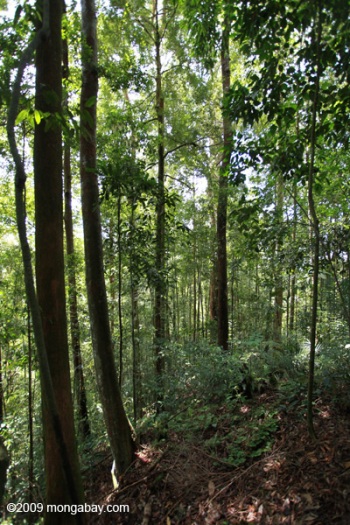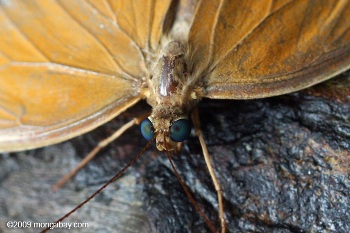The Forest Stewardship Council (FSC), a global certifier of sustainably managed forest, has dropped another Indonesian company for the destruction of rainforests. Asia Paper Resources International Limited (APRIL), has had its certification suspended due to evidence of conversion of rainforests for acacia plantations, the destruction of ‘High Conservation Value Forest’, draining peatlands, as well as continuing conflicts with local communities. The decision was made by the Rainforest Alliances Smartwood, an accreditation program with the FSC.
“This means that until practices on the ground drastically improve, pulp and paper products from Indonesia must be off limits to anyone who cares about human rights, the climate or rainforests,” said Lafcadio Cortesi of the Rainforest Action Network (RAN) in a press release.
APRIL is not the first pulp and paper company to lose its certification due to deforestation and problems with communities. Asia Pulp and Paper (APP)—Indonesia’s largest paper producer—lost its FSC certification in 2007 due to similar problems. A number of big paper purchasers have also dropped APP—including Office Depot, Unisource, Tiffany and Co., Wal-Mart, Staples, Woolworths, and Gucci—to the tune of an estimated loss of $300 million in 2008.
 Rainforest on the island of Sumatra, Indonesia. Photo by: Rhett A. Butler. |
“Business as usual practices by APRIL, and its competitor APP, are failing to meet the most basic international standards for environmental and social responsibility. Smartwood’s decision confirms the fact that, if you’re a paper purchaser, it’s just too controversial to buy from either APRIL or APP,” added Cortesi. .
Local communities have praised Smartwood’s decision.
“Smartwood is finally validating what communities have known all along,” said Syahrizal community leader and founding member of the Riau Province Community Council for Peatlands (Dewan Jaringan Masyarakat Gambut Riau). “APRIL is failing to respect communities’ rights, appropriating our traditional lands and cutting down the forests we rely on for our food, shelter and livelihoods.”
APRIL was initially granted FSC certification a year ago to see if the company could reach the minimum standard required by FSC. The paper giant will now have time to fix errors due to the suspension, but if changes are not made, such as halting deforestation within ten days, FSC may decide to completely revoke the certification. However, some believe the FSC is being too lenient by giving APRIL another chance.
“The certification should be revoked permanently because it is now proved that APRIL could not stop the bad practices in its operations which cause environmental degradation and social conflict,” said Hariansyah Usman, Director of WALHI Riau, a local NGO.
The FSC has faced criticism in the past for certifying companies that many environmental groups see as destructive to tropical or temperate forests and disrespectful of indigenous communities. Despite such criticisms, the FSC remains supported by big environmental groups like WWF and Greenpeace.
 Home to well-known animals such as rhinos, tigers, and elephants, Indonesia also sports a vast diversity of mini-fauna, such as this blue-eyed butterfly on the island of Sumatra, Indonesia. An Indonesian official recently speculated that only half of the nation’s biodiversity was known to science. Photo by: Rhett A. Butler. |
Indonesia is now the world’s third largest emitter of greenhouse gases largely due to deforestation for palm oil plantations, pulp and paper plantations, and logging. Between 1990 and 2005, Indonesia lost more than 28 million hectares of forest, including 21.7 hectares of virgin forest. The country forest cover has declined from 82 percent in the 1960s to less than half today.
“The President of Indonesia has called for a shift to low carbon development. If the paper industry is going to get on board with that low carbon vision, they must adopt proper reforms that reduce emissions and do not cause conflict with communities,” said Ahmad Zazali, Director of Scale Up (Sustainable Social Development Partnership), a local NGO.
In addition to carbon emissions, deforestation has also placed much of Indonesia’s biodiversity at risk of extinction. Well-known species like the Sumatran and Bornean orangutans, clouded leopards, Sumatran tigers, elephants, and Javan and Sumatran rhinos have all seen population drops due to habitat loss.
Together APRIL and APP make up 80 percent of Indonesia’s paper production.
Related articles
Paper provider for fashion gurus drops APP due to deforestation across Indonesia
(12/02/2009) One by one, the fashion industry’s biggest companies are leaving Asian Pulp and Paper (APP)—and deforestation in Indonesia—behind. The newest defector is PAK 2000, a packaging company for fashion products. After a sustained campaign by the Rainforest Action Network (RAN) and fashion companies buying from PAK 2000, the New Hampshire-based company, has announced that it is severing all ties with APP by the end of the year. The announcement means that big famous companies—from Versace to J. Crew—will have an easier time avoiding paper products that cause rainforest destruction.
Finnish paper company to sever ties with logging firm linked to rainforest destruction in Indonesia
(11/13/2009) Finnish paper company UPM-Kymmene will stop buying paper pulp from Asia Pacific Resources International Holding Limited (APRIL) due to concerns over the company’s poor environmental record, reports Greenpeace. UPM-Kymmene contact’s represents 4 percent of APRIL’s total pulp production, worth over US$55 million annually, according to the environmental group.
Gucci drops APP in pledge to save rainforests
(11/03/2009) One of the world’s largest and most prestigious fashion brands has stated it will stop sourcing paper from Indonesian forests and will drop Asia Pulp and Paper (APP) as a supplier, which has become notorious for tropical deforestation. The move comes after pressure from the Rainforest Action Network (RAN) on the fashion industry to stop sourcing paper from threatened rainforests for their shopping bags.







